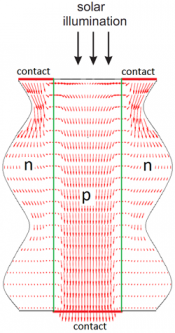Microvolt
|
is free C++ program for semiconductor devices modeling (diodes, solar cells, transistors etc.). Code can be compiled under UNIX and Windows. In the future we are planning to develop its parallel MPI version. How does it work? Poisson and current continuity equations are discretized using finite-difference method in 1D, 2D, 3D, and cylindrical coordinates. Resolution of rectangular mesh can vary along each direction. Multiple meshes with different resolution can be used at the same time. Architecture of the code allows easily include other types of meshes. To solve system of discretized equations on a mesh(es) we use Newton-Rhapson method. Linear algebra operations can be performed using PARDISO, LAPACK or any other solvers. For solar cells modeling, one can use carriers generation profile obtained from independent electromagnetic simulation. We are using results obtained by EMTL that can be substituted as an input to Microvolt. Application of the code Microvolt was successfully used to simulate solar cells of different geometries (nanowires, textured thin films) based on Si, GaAs, CdTe, etc. This is list of chosen publications:
|

|
Download
You can download the code from Microvolt web-page.


